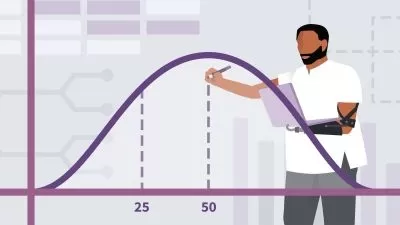Foundations of Probability and Statistics
EDUCBA Bridging the Gap
1:40:29
Description
Unlock the power of data with our comprehensive course on probability and statistics for effective data analysis!
What You'll Learn?
- Understanding of Random Variables: Students will grasp the concept of random variables and their significance in probability theory.
- Probability Distributions: They will explore various probability distributions, including discrete and continuous distributions.
- Basic Probability Concepts: Students will learn the fundamentals of probability, including mutually exclusive events, independent events.
- Statistical Measures: The course will cover essential statistical measures, including mean, variance, and standard deviation, enabling students to summarize.
- Correlation and Covariance: Students will understand the relationships between variables through correlation and covariance, equipping them with tools.
- Moments and Skewness: They will learn about central moments and the characteristics of distributions, such as positive skewness.
- Estimation Techniques: The course will introduce the concept of the best linear unbiased estimator (BLUE) and its application in statistical analysis.
Who is this for?
What You Need to Know?
More details
DescriptionWelcome to "Foundations of Probability and Statistics," a course tailored for aspiring data analysts, researchers, and anyone interested in understanding the core concepts of probability and statistics. In this course, you will explore the fundamental principles that govern random phenomena and the statistical techniques used to analyze and interpret data. Whether you are starting your journey in data science or seeking to enhance your analytical skills, this course provides a solid foundation in probability and statistics, setting you on the path to making informed decisions based on data.
Section 1: Introduction to Probability
In the first section, we lay the groundwork for understanding probability. You will begin with an introduction to random variables, which are the building blocks of probability theory, allowing you to quantify uncertainty. Next, we will explore probability distributions, which describe how probabilities are assigned to different outcomes. To solidify your understanding, we’ll examine an engaging example of rolling two dice to illustrate the concepts in action. You will also learn the fundamental principles of probability itself, including mutually exclusive events, where the occurrence of one event precludes the occurrence of another. The section wraps up with an introduction to contingency tables and independent events, providing you with a comprehensive overview of probability concepts and their applications.
Section 2: Basic Statistics
Transitioning to statistics, this section covers essential statistical concepts that will enhance your data analysis skills. We begin with an overview of basic statistics, followed by an in-depth exploration of mean and variance—two critical measures that summarize data sets. You will learn how to calculate standard deviation, providing insights into the dispersion of data points around the mean. Furthermore, we will delve into correlation and covariance, allowing you to understand relationships between variables. The section continues with a discussion on central moments, offering insights into the shape of data distributions, and concludes with the concept of positive skewed distribution and the best linear unbiased estimator, empowering you with the tools to analyze and interpret data effectively.
Conclusion:
By the end of this course, you will have a solid understanding of the key concepts in probability and statistics. You will be equipped with the analytical skills necessary to tackle real-world problems and make data-driven decisions. Whether you are looking to advance your career in data analysis or simply enhance your quantitative skills, "Foundations of Probability and Statistics" provides the knowledge and tools you need to succeed in a data-centric world. Join us on this exciting journey into the world of data analysis!
Who this course is for:
- Students in Related Fields: Individuals pursuing degrees in fields such as mathematics, statistics, data science, engineering, economics, or social sciences who need a solid foundation in probability and statistics.
- Professionals Seeking Data Literacy: Professionals from various industries looking to enhance their data analysis skills and improve their decision-making abilities through a better understanding of statistical principles.
- Lifelong Learners: Anyone interested in learning about probability and statistics for personal growth, including those preparing for advanced studies or certifications that require statistical knowledge.
- Individuals New to Statistics: Beginners with little to no prior knowledge of statistics who want to build a strong base in the subject to support further study or practical application in their careers.
Welcome to "Foundations of Probability and Statistics," a course tailored for aspiring data analysts, researchers, and anyone interested in understanding the core concepts of probability and statistics. In this course, you will explore the fundamental principles that govern random phenomena and the statistical techniques used to analyze and interpret data. Whether you are starting your journey in data science or seeking to enhance your analytical skills, this course provides a solid foundation in probability and statistics, setting you on the path to making informed decisions based on data.
Section 1: Introduction to Probability
In the first section, we lay the groundwork for understanding probability. You will begin with an introduction to random variables, which are the building blocks of probability theory, allowing you to quantify uncertainty. Next, we will explore probability distributions, which describe how probabilities are assigned to different outcomes. To solidify your understanding, we’ll examine an engaging example of rolling two dice to illustrate the concepts in action. You will also learn the fundamental principles of probability itself, including mutually exclusive events, where the occurrence of one event precludes the occurrence of another. The section wraps up with an introduction to contingency tables and independent events, providing you with a comprehensive overview of probability concepts and their applications.
Section 2: Basic Statistics
Transitioning to statistics, this section covers essential statistical concepts that will enhance your data analysis skills. We begin with an overview of basic statistics, followed by an in-depth exploration of mean and variance—two critical measures that summarize data sets. You will learn how to calculate standard deviation, providing insights into the dispersion of data points around the mean. Furthermore, we will delve into correlation and covariance, allowing you to understand relationships between variables. The section continues with a discussion on central moments, offering insights into the shape of data distributions, and concludes with the concept of positive skewed distribution and the best linear unbiased estimator, empowering you with the tools to analyze and interpret data effectively.
Conclusion:
By the end of this course, you will have a solid understanding of the key concepts in probability and statistics. You will be equipped with the analytical skills necessary to tackle real-world problems and make data-driven decisions. Whether you are looking to advance your career in data analysis or simply enhance your quantitative skills, "Foundations of Probability and Statistics" provides the knowledge and tools you need to succeed in a data-centric world. Join us on this exciting journey into the world of data analysis!
Who this course is for:
- Students in Related Fields: Individuals pursuing degrees in fields such as mathematics, statistics, data science, engineering, economics, or social sciences who need a solid foundation in probability and statistics.
- Professionals Seeking Data Literacy: Professionals from various industries looking to enhance their data analysis skills and improve their decision-making abilities through a better understanding of statistical principles.
- Lifelong Learners: Anyone interested in learning about probability and statistics for personal growth, including those preparing for advanced studies or certifications that require statistical knowledge.
- Individuals New to Statistics: Beginners with little to no prior knowledge of statistics who want to build a strong base in the subject to support further study or practical application in their careers.
User Reviews
Rating
EDUCBA Bridging the Gap
Instructor's Courses
Udemy
View courses Udemy- language english
- Training sessions 14
- duration 1:40:29
- Release Date 2025/03/10











